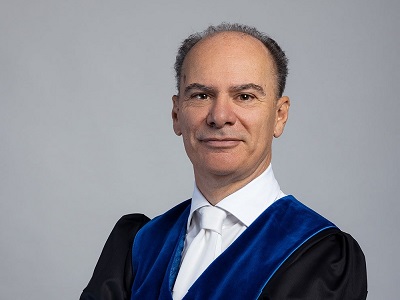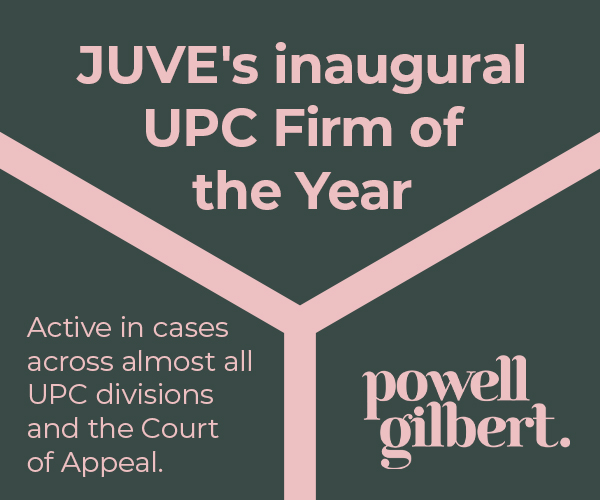Court of Appeal rules Suinno’s representative not independent
The position of Suinno's representative as the company's managing director and shareholder precludes him from representing Suinno in an application for confidentiality. This was the ruling by the UPC's Court of Appeal yesterday. The Solomonic judgement may be decisive in future UPC cases in which in-house counsel represent their own companies.
12 February 2025 by Christina Schulze
On 29 January, the UPC Court of Appeal heard an appeal brought by Finnish company Suinno Mobile & AI Technologies Licensing Oy in its dispute with Microsoft (case ID: UPC_CFI_164/2024). The case concerns an accusation of infringment of Suinno’s EP 2 671 173. The patent protects a method for browsing by walking. But a significant part of the case so far has involved the role and limits of UPC representatives working in-house.
The situation becomes more complicated when UPC representatives working in-house are also the inventors of the patent-in-dispute. This raises fundamental questions about the independence of such in-house representatives.
Inventor, MD and counsel
In the course of the proceedings, Suinno also filed an application requesting that certain documents be kept confidential from both the public and Microsoft.
Helsinki-based patent attorney Mikko Väänänen is both the inventor of the patent-in-suit and the main representative for Suinno in the UPC case. According to the judgments, he is also the company’s managing director and main shareholder.
Nadine Westermeyer from Bardehle Pagenberg, representing Microsoft, argued that Väänänen could not be considered independent within the meaning of 2.4.1 of the Code of Conduct for UPC Representatives because he is financially dependent. Initially, this argument was not accepted by the Paris central division in June 2024. The judge granted Suinno’s application and ordered access to documents be restricted to Microsoft representatives (case ID: RoP262A No. App_19084/2024).
Code of Conduct upheld
The specific rule of the Code of Conduct invoked by Westermeyer states that “a representative shall act towards the Court as an independent counselor by serving the interests of his or her clients in an unbiased manner without regard to his or her personal feelings or interests”.

Paolo Catallozzi
The court led by judge rapporteur Paolo Catallozzi stated in the decision “the lack of independence must therefore be assessed not in an absolute sense, but with reference to the possible harm to the interests of the party on whose behalf the professional acts”.
Ultimately, the judges ruled “it can be observed that given the instrumental nature of the obligation of independence to protect the party’s right to an effective defense in court, its possible violation cannot be asserted by the counterparty, which has no interest in such a finding, but only by the party for whose benefit such an obligation is placed”.
However, following an application for a panel review brought by Microsoft in July, the court of first instance set aside the initial order. The panel declared Suinno’s application inadmissible and ordered the disclosure of documents to certain identified persons only. The court granted leave to appeal, which Suinno did.
Court of Appeal sets framework
Yesterday the Court of Appeal rejected Suinno’s appeal (case ID: UPC CoA_563/2024). The panel comprising president Klaus Grabinski, Peter Blok and judge-rapporteur Emmanuel Gougé upheld the first-instance ruling. The judges came to the conclusion that “Suinno has not been validly represented by a representative within the meaning of Art. 48 (1) (2) and (5) UPCA”.
- Klaus Grabinski
- Peter Blok
- Emmanuel Gougé
The court of Appeal judges clarified, that “no corporate representative of a legal person or any other natural person who has extensive administrative and financial powers within the legal person, whether as a result of holding a high-level management or administrative position or holding a significant amount of shares in the legal person, may serve as a representative of that legal person, regardless of whether said corporate representative of the legal person or natural person is qualified to act as a UPC representative.”
As a result, the judges stated that, even though Väänänen is a qualified UPC representative, his “administrative and financial powers within Suinno – due to his position as managing director and main shareholder – preclude him from representing Suinno” in filing an application to keep documents confidential from Microsoft.
Yes and no for in-house representation
However, the judges also emphasised that the judgment only refers to the current application for confidentiality. They stated that it is not for them to decide on Väänänen’s ability to represent Suinno in the infringement case, but for the court of first instance.
The decision of the Court of Appeal does not, therefore, fundamentally rule out the representation of companies by in-house representatives. In their headnotes, the judges write that “a representative who is employed by a party must act towards the Court as an independent counsellor by serving the interests of his or her client in an unbiased manner without regard to his or her personal feelings or interests, pursuant to the Code of Conduct for UPC Representatives”.
In-house counsel raise concerns
The case has given rise to fears among in-house representatives in the patent community. Back in January, prior to the oral hearing, the president of the patent attorney association CIPA, Bobby Mukherjee, wrote an open letter to UPC judges Klaus Grabinski, Emmanuel Gougé and Peter Blok. He expressed his concerns about the impact of the first-instance judgment on the role of in-house UPC representatives.
According to information from CIPA, Grabinski replied to the letter stating that CIPA was not a party nor intervenor to the proceedings, and because neither the UPC Agreement nor the UPC Rules of Procedure allowed for an amicus curiae letter, it could not form part of the court’s proceedings.
Mukherjee himself commented on this in writing on the CIPA website, saying, “While we are disappointed that the court cannot formally accept the points I raised in my letter, we are pleased to have been able to put the concerns of our members to the judges and to have them acknowledged.” (Co-authors: Laura King and Mathieu Klos)
All images of judges: ©Unified Patent Court




